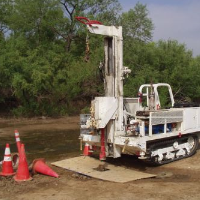Court Rules State Doesn’t Have to Pay Landowners for Tunnel Project Tests
 Environmental testing for the water tunnel--Credit: California Department of Water Resources
Environmental testing for the water tunnel--Credit: California Department of Water Resources
By Elizabeth Warmerdam, Courthouse News Service
State officials don’t have to pay landowners to access their property for environmental testing as part of a massive tunnel project that will divert water to Central and Southern California, the state’s high court ruled Thursday.
The decision (pdf) reversed an opinion by the Third District Court of Appeal stating that because the testing would constitute a taking of private property, the owners would be entitled to a determination of the market value of the property rights the state was acquiring for the project.
The California Supreme Court ruled unanimously that the state can obtain a court order specifically authorizing the state Department of Water Resources (DWR) to conduct the proposed geological activities on the properties at issue.
The court said that the precondemnation entry and testing statutes at issue do not limit the activities the state may perform to those that are only innocuous or superficial, rejecting the landowners’ claim that the state overreached in invoking the statutes for the testing at issue.
Although the decision did not specify that rent payments would be required, the Supreme Court did state that landowners can propose limitations on the testing and can seek compensation if they can show that the testing damages their land.
“The landowner may present evidence regarding the amount of funds the department should be required to deposit in advance of its entry and undertaking of the geological activities to compensate the property owner for any loss sustained as a result of those activities,” Chief Justice Tani Cantil-Sakauye wrote.
Authorizing the trial court to limit the testing activities to protect the interests of the property owner and requiring the state to pay an amount determined to cover the damages satisfies the requirements of the California takings clause, the high court ruled.
However, the landowners must be provided the option of obtaining a jury trial on the measure of damages, the court ruled.
“[P]roviding a property owner the ability to obtain a jury determination of damages at the latter stage of the precondemnation proceeding will not interfere with or undermine the fundamental purposes of policies of the precondemnation entry and testing legislation,” Cantil-Sakauye wrote.
The high court’s decision is a major victory for Gov. Jerry Brown in his quest to build two 30-mile tunnels to send fresh water under the Sacramento-San Joaquin River Delta to thirsty farms and residents in the lower half of California.
Before beginning the $15.7 billion project, the state needs to run geological and environmental suitability tests on more than 150 privately owned parcels of land to determine the exact route for the tunnels. Testing will include looking for animals and boring holes up to 205 feet into the ground, which will later be refilled with cement or bentonite grout.
Paying the property owners for the market value of their property rights would have potentially added millions of dollars to the cost of the project. The properties affected are located in San Joaquin, Sacramento, Yolo, Contra Costa and Solano counties.
Landowners balked when the department said it planned to do the tests without buying the properties first. They said the tests would be lengthy and invasive.
Norman Matteoni, an attorney for one of the major property owners affected, said he is disappointed in the Supreme Court’s ruling.
“The court upheld the statute as authorizing the type of activities DWR sought. But it agreed with the property owners that the statute did not provide for the right of a jury trial for compensation of damages that may occur. There will be continued litigation as the court referred the matter back to the appellate court,” Matteoni said.
DWR representatives did not immediately respond to a request for comment Thursday.
To Learn More:
Feds Say State’s $24.5-Billion Water Tunnel Plan Could Ruin the Delta (by Ken Broder, AllGov California)
Governor Brown Tells Critics of His Delta Twin-Tunnel Plan to “Shut Up” (by Ken Broder, AllGov California)
Environmental Concerns Swirl around Proposed $15-Billion Water Tunnel Project (by Ellen Knickmeyer and Scott Smith, Associated Press)
- Top Stories
- Controversies
- Where is the Money Going?
- California and the Nation
- Appointments and Resignations
- Unusual News
- Latest News
- California Forbids U.S. Immigration Agents from Pretending to be Police
- California Lawmakers Urged to Strip “Self-Dealing” Tax Board of Its Duties
- Big Oil’s Grip on California
- Santa Cruz Police See Homeland Security Betrayal in Use of Gang Roundup as Cover for Immigration Raid
- Oil Companies Face Deadline to Stop Polluting California Groundwater





